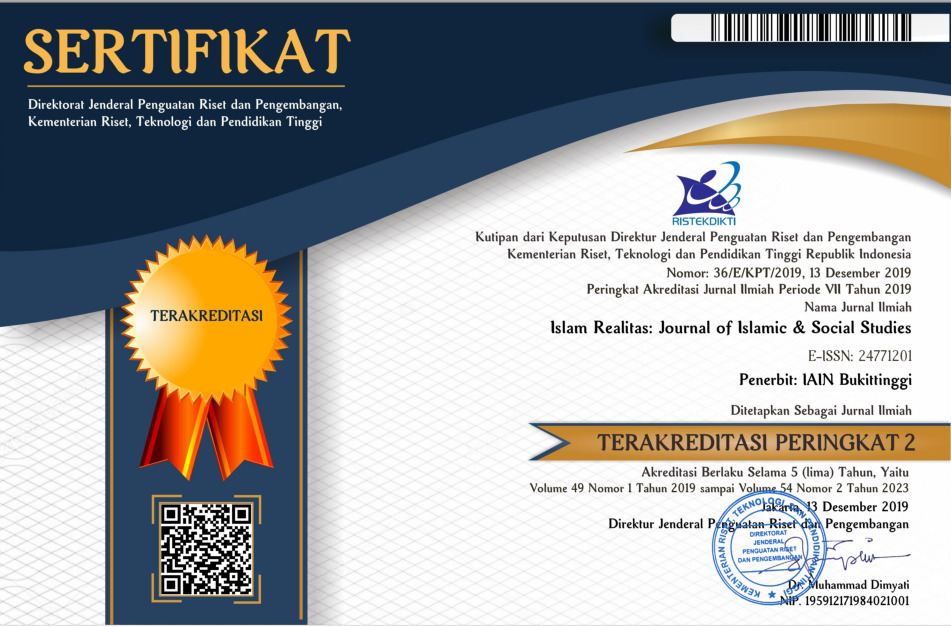Kata-kata Serapan dalam Alquran Perspektif Ulama Tafsir
DOI:
https://doi.org/10.30983/fuaduna.v3i1.2088Abstract
One of the issues debated by Arab linguists and interpreters of the Quran is whether all the words in the Koran come from native Arabic, or are there uptake words from foreign languages used in the Koran. The analysis of linguists states that the absorption words in various languages can arise due to geographical location, trade relations, immigration, politics, culture, economy, industry, and others. In the context of absorption words in the Koran the scholars are divided into three opinions, namely the group of scholars who reject the absorption of words in the Koran; Second, groups who believe that there are absorption words in the Koran; and third, which takes a middle ground with a view that the word uptake in the Koran has its specificities.
References
Abdul Rahman, Ad-Dakhil Fi al-Lughah al-Arabiyah wa Lahjatiha, Madinah: tp., 1975
Al-Razi, Mafatih al-Ghaib, 2000, (http://www.altafsir.com), diakses 17 April 2011
Al-Suyuti, Jalaluddin, al Muzhir fi ulum al-Lugah wa an-Wau’ha, Kairo: dar at-Turas,tt, Jilid 1
Al-Suyuti, Jalaluddin, al-Itqon fi ulum al-Qur’an, Libanon: Dar al-Kutub al-Ilmiyah,t, jilid 1
Anis, Ibrahim,dkk, al-Mu’jam al-Wasid, Kairo: Maktabah as-Suruk ad-Dauliyah, 2004, cet ke 4
Armas, Adnin, Kosa Kata Asing Al-Qur’an, artikel. http://harus masuk islam. wordpress.com/. Rabu, 23 Januari 2018
Brummer, Vincent, Theology and Philosophical Inquiry: An Introduction, New York: The Macmillan Press, Ltd. 1981
Departemen Agama RI,AL-Qur’an dan Terjemahannya, Jakarta: al-Huda, 2002
Ghonim, Karim Sayyid, Al Lughoh Al Arabiyah wal As Shofwah Al Ilmiyah Al Haditsah, (Kairo: Maktabah Al Khonji, 1999
Ibnu Katsir, Al-Bidayah wa al-Nihayah, tt. tp.
Karim Sayyid Ghonim. Al Lughoh Al Arabiyah wal As Shofwah Al Ilmiyah Al Haditsah, (Kairo: Maktabah Al Khonji, 1999
Klaus Beyer, The Aramic Language, Gottingen: Vandehoek and Ruprech, 1986, h. 38-43
Ramadhan, Abdul At-Tawwab, Fushul fi Fiqhi Al Arabiyah, Kairo: Maktabah Al Khonji, 1999
Robinson, James M, “Hermeneutics Since Bith†dalam The New Hermeneutics, ed. J.M. Robinson dan John B. Cobb, New York: Happer and Row Publisher, 1964
Ramadhan Abdul At Tawwab, Fushul fi Fiqhi Al Arabiyah, Kairo: Maktabah Al Khonji, 1999 Cet. II
Richard E. Palmer, Hermeneutics: Interpretation Theory in Schleirmacher, Dilthey, Heidegger and Gadamer, Evanston: North Easteren University press, 1969
Pierre Labrouse, Kamus Umum Indonesia-Perancis, Paris: Association Archipel dan Jakarta: Gramedia, 1985.
Russel Jones, Arabic Loan-Words In Indonesian, A Check-List of Words of Arabic and Persian Origin in Bahasa Indonesia and Traditional Malay, In The Reformed Spelling, London: School of Oriental and African Studies, 1978
Sirhan, Muhammad, Fiqh al-Lughah, Riyadh: Maktabah Riyadh, 1956, h. 72
Syamsul Hadi, Kata dan Istilah Asing Dalam Bahasa Arab, Jurnal Humaniora, Vol. 1, tahun 1995
Samarkandi, Bahrul Ulum, (www.qurancomplex.com), diakses 17 April 2011
Zamakhsari, Al-Kassaf, 2000, (http://www.altafsir.com), diakses 17 April 2017
Downloads
Submitted
Accepted
Published
Issue
Section
License
Authors who publish with this journal agree to the following terms:
- Authors retain copyright and grant the journal right of first publication with the work simultaneously licensed under a Creative Commons Attribution-ShareAlike 4.0. that allows others to share the work with an acknowledgment of the work's authorship and initial publication in this journal.
- Authors are able to enter into separate, additional contractual arrangements for the non-exclusive distribution of the journal's published version of the work (e.g., post it to an institutional repository or publish it in a book), with an acknowledgment of its initial publication in this journal.
- Authors are permitted and encouraged to post their work online (e.g., in institutional repositories or on their website) prior to and during the submission process, as it can lead to productive exchanges, as well as earlier and greater citation of published work (See The Effect of Open Access).














